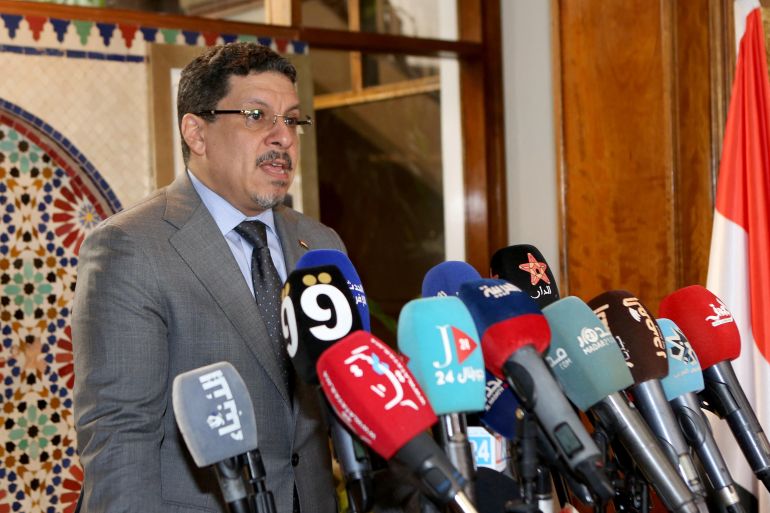Yemen appoints Foreign Minister Ahmed Awad bin Mubarak as prime minister
Bin Mubarak replaces Maeen Abdulmalik Saeed amid rising tensions as Houthi rebels attack Red Sea shipping, triggering US and British reprisal strikes.

Yemen’s internationally recognised government has named Foreign Minister Ahmed Awad bin Mubarak as the new prime minister in a surprise appointment.
Bin Mubarak replaces Maeen Abdulmalik Saeed at a time of rising tensions in the Arabian Peninsula’s poorest country after a spate of Red Sea attacks by Houthi rebels on ships that have prompted retaliatory strikes by the United States and the UK.
Keep reading
list of 4 itemsUS, UK hit 36 Houthi targets in Yemen amid Gaza war spillover fears
How have Red Sea attacks by Yemen’s Houthi fighters affected companies?
Which Houthi targets were hit by US-UK strikes in Yemen?
A decree issued on Monday by Yemen’s Presidential Leadership Council and carried by the official Saba news agency announced bin Mubarak’s appointment as premier and assigned the outgoing prime minister to the post of presidential adviser.
It did not give a reason for the move.
Bin Mubarak, Yemen’s former ambassador to the US, is widely seen as a staunch adversary of the Houthi rebels.
He came to prominence in 2015 when he was kidnapped by the Houthis while he served as Yemen’s presidential chief of staff during a power struggle with then-President Abd-Rabbu Mansour Hadi.
The seizure of bin Mubarak helped plunge Yemen into a political crisis, resulting in clashes between the Houthis and Hadi’s presidential guards that prompted the president and the government to resign.
Bin Mubarak was also appointed as the country’s envoy to the United Nations in 2018.
Mohammed Al-Basha, a Yemen expert for the US-based Navanti research group, said bin Mubarak is seen as one of the “architects of the Saudi-led coalition” that intervened against the Houthis in 2015 to prop up the internationally recognised government, a year after the rebels captured the capital, Sanaa.
“The Houthis are unlikely to embrace the appointment of bin Mubarak,” he said, adding that bin Mubarak is a longtime adversary of the group.
His appointment “is likely to intensify tensions between the Houthis and the internationally recognised government”, the expert added.
The Houthis, part of the anti-Western, anti-Israel “axis of resistance” of Iranian-backed groups, have been targeting Red Sea shipping for months, triggering US and British reprisal attacks.
The Houthis have launched more than 30 attacks on commercial shipping and naval vessels since November 19, according to the Pentagon.
The rebels said the attacks are in solidarity with the Palestinians and in protest against Israel’s war on Gaza that has been raging since October.
The attacks have prompted some shipping companies to detour around Southern Africa to avoid the Red Sea, a vital route normally taken by about 12 percent of global maritime trade.
In response, US and British forces have launched strikes targeting Houthi missile sites and other military facilities. The US has also carried out a series of strikes.
In recent remarks, bin Mubarak called on the European Union to designate the Houthis as a “terrorist group” and has pushed for increased military support to government forces in the wake of the Red Sea attacks.